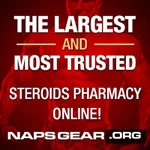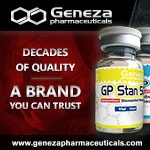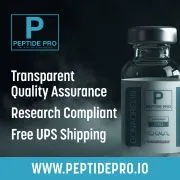Muscle Insider
New member

But with all the buzz surrounding these options, it’s essential to dive deeper and understand the science behind them. What are the mechanisms at play? Are there any risks or side effects? And, most importantly, which option is better suited for your specific goals?
Peptides, the new kids on the block, have been garnering attention for their potential to enhance performance, promote muscle growth, and even improve anti-aging effects. On the other hand, TRT (Testosterone Therapy) has long been a staple for individuals seeking hormonal balance and increased vitality.
Let’s see what hormone replacement therapy is best for you!
Key Takeaways
- Peptide Therapy uses natural peptides to improve certain aspects of our health
- TRT is a therapy that simply replaces ‘missing’ Testosterone
- Both can be used effectively and safely, however, they have wildly different goals
Peptides vs Testosterone Replacement Therapy
Peptides and TRT (Testosterone Replacement Therapy) are two distinct approaches to performance enhancement that have gained significant attention in recent years. While both aim to optimize physical performance and well-being, they differ in their mechanisms of action and potential benefits.
When comparing peptides and TRT, it is essential to consider individual goals and circumstances.
Peptides offer a versatile approach with targeted benefits, allowing users to address specific areas of interest. TRT, on the other hand, provides a more comprehensive hormonal intervention by directly increasing testosterone levels.
Ultimately, the choice between peptides and TRT depends on personal goals, medical considerations, and the guidance of a qualified healthcare professional. It is crucial to weigh the potential benefits and risks associated with each option to make an informed decision.
Best for Health Problems
Well, it depends on your health problems.
Low testosterone, also known as hypogonadism, can give rise to various health complications. One of the primary concerns is a decrease in muscle mass and strength, leading to reduced physical performance and increased vulnerability to injuries. Low testosterone levels have also been linked to decreased bone density, putting individuals at a higher risk of developing osteoporosis and fractures. Additionally, low testosterone can contribute to changes in mood, causing irritability, fatigue, and even depression. Thus, the best way to improve low Testosterone levels is by using TRT.
Peptides on the other hand have a massive variety of benefits, depending on which health complications you have. Growth Hormone replacement therapy can help stimulate muscle growth, enhance recovery, and promote overall physical performance. TB500 can help control inflammation and improve recovery from injuries. DSIP is probably the best peptide for improved sleep. As you can see, there are about a dozen different peptides that can improve your health. Thus, Peptide Therapy is better for overall health problems, since it has a far broader approach.
Best for Sexual Health
Sexual health problems can be rooted in various complications. Sexual health may be affected, as low testosterone can lead to decreased libido, erectile dysfunction, and fertility issues.
Overall, for sexual health (for men), TRT is better.
However, there are certain complications that would react better to peptides. Low growth hormone production could lead to sexual problems – HGH would be the perfect peptide therapy.
Best for the Aging Process
Testosterone won’t do much for the aging process. Peptide therapy is about 1,000% better, primarily for its ability to increase growth hormone production.
One of the key effects of growth hormone on aging is its impact on muscle mass and strength. Growth hormone promotes protein synthesis and stimulates the growth of lean muscle tissue. With lower levels of growth hormone, muscle mass tends to decrease, leading to muscle weakness and a higher risk of frailty in older individuals.
Growth hormone also influences bone health. It stimulates bone formation and helps maintain bone density. Reduced growth hormone levels can contribute to decreased bone density and increased susceptibility to fractures and osteoporosis.
Furthermore, growth hormone affects metabolism and body composition. It promotes fat metabolism and helps regulate the distribution of fat in the body. Inadequate growth hormone levels can lead to an increase in body fat, particularly around the abdomen, which is associated with an elevated risk of metabolic disorders such as insulin resistance, diabetes, and cardiovascular issues.
What are Peptides?
Injectable peptides are short chains of amino acids that are administered via subcutaneous or intramuscular injections. These synthetic or naturally occurring molecules act as signaling molecules in the body, influencing various physiological processes.
#1 Most Researched Peptide Vendor
#1 Biggest Selection of Tested Peptides: Core PeptidesCore Peptides has recently entered the market with a wide range of over 78 peptides and blends available for purchase on their website. As a new player in the industry, they may not have Certificates of Analysis (COAs) readily available for every product just yet. However, the company has expressed its commitment to ensuring that all products are thoroughly tested and verified before being made available for purchase.
Despite being a newcomer, Core Peptides has already made a positive impression on many of its customers. Their dedication to transparency and quality control is evident in their promise to make COAs available for all products very soon. In fact, they are continuously adding new tests to their current repertoire to ensure that their products meet the highest standards possible.
It is worth noting that peptides and blends are not only becoming increasingly popular in the health and fitness industry but also other areas such as research and development. As such, the demand for high-quality and reliable sources of peptides and blends has also increased. Core Peptides seems to have recognized this growing demand and is committed to providing its customers with the best products possible.
Overall, Core Peptides’ emergence in the market is a promising development. With their growing selection of peptides and blends, dedication to transparency, and commitment to quality control, it is likely that they are establishing themselves as a trusted and reliable source for these products.
[/i]Core Peptides Overview? ? Forms: Injectable, topical, and peptide blends
? Lab Verified (COA): Mostly, but constantly being updated with new tests
? Shipping Policy: Free for $200+, Flat rate $9.95, Priority or $49.95 for Overnight
? Payment Methods: Credit cards, Venmo, Zelle, CashApp
? Guarantees: Free exchange for damaged product
? Promo Codes: 10% off with CP10
? Price (BPC157 5mg equivalent): $47
?? Rating: 4.8
?? Go to Full review
- Provides up-to-date COAs
- Various payment methods, including Bitcoin
- COAs not available on all products
Injectable peptides have gained popularity in the fields of medicine, sports, and anti-aging due to their potential to enhance performance, stimulate muscle growth, aid in tissue repair, and promote overall well-being
Benefits of Peptides
- Muscle growth: Injectable peptides can stimulate muscle growth and enhance muscle protein synthesis, leading to increased muscle mass and strength.
- Fat loss: Certain peptides have the ability to promote fat metabolism and aid in reducing body fat, especially stubborn fat deposits.
- Injury recovery: Injectable peptides can accelerate the healing process by promoting tissue repair, collagen synthesis, and reducing inflammation, aiding in the recovery from injuries or surgeries.
- Improved athletic performance: Peptides can enhance endurance, stamina, and overall athletic performance by increasing oxygen delivery, improving energy levels, and reducing fatigue.
- Anti-aging effects: Some peptides have been shown to have anti-aging properties, promoting skin elasticity, reducing wrinkles, and improving overall skin health.
- Enhanced immune function: Certain peptides can boost immune system function, helping to strengthen the body’s defense against infections and illnesses.
- Cognitive enhancement: Peptides may improve cognitive function, memory, and focus, potentially benefiting individuals looking for enhanced mental performance.
- Joint and bone health: Injectable peptides can aid in improving joint health and reducing inflammation, while also stimulating bone mineralization and density.
- Increased libido: Some peptides can support sexual health by improving libido and sexual performance.
- Overall well-being: Injectable peptides may contribute to an overall sense of well-being by promoting better sleep, regulating mood, and reducing stress levels.
Side Effects of Peptides
- Allergic reactions: Some individuals may experience allergic reactions to peptides, characterized by symptoms such as rash, itching, swelling, or difficulty breathing. It is crucial to be aware of any known allergies or sensitivities before starting peptide therapy.
- Injection site reactions: Injection site reactions such as redness, swelling, pain, or irritation can occur. These reactions are typically mild and temporary but should be monitored and reported to a healthcare professional if they persist or worsen.
- Water retention: Certain peptides may cause water retention, leading to bloating or swelling in some individuals. This can be particularly noticeable in areas such as the face, hands, or feet.
- Hormonal imbalances: Depending on the type and dosage of the peptide used, there is a possibility of hormonal imbalances. This can manifest as fluctuations in hormone levels, which may have various effects on the body and can require careful monitoring and adjustment of the peptide regimen.
- Elevated blood sugar levels: Some peptides may impact glucose metabolism, potentially leading to elevated blood sugar levels in susceptible individuals. This can be a concern for individuals with pre-existing diabetes or insulin resistance.
What is TRT?
TRT, or Testosterone Replacement Therapy, is a medical treatment that involves the administration of exogenous testosterone to individuals with low testosterone levels. Testosterone is a vital hormone responsible for various functions in the body, including muscle growth, bone density, libido, mood regulation, and overall well-being.
FountainTRT Summary
#1 Best Online TRT Clinic: FountainTRTFountainTRT has legitimately built a cutting edge TRT service. When you go to their website and take their quiz you realize that other TRT providers are stuck in 2015.
FountainTRT feels a lot closer to a startup than a TRT clinic. They provide a seamless quiz, evaluation, and then give you an option to do blood work locally at a LabCorp location, or alternatively have some COME TO YOUR HOUSE.
They are a premium concierge service that is on call 24/7 for any questions and urgent labs required.
While other companies hire freelance professionals, their medical team is comprised of full time doctors that will monitor you on a 1:1 basis. Tadalafil, HCG, Anastrozole and Enclomiphene.
[/i]FountainTRT Overview? Treatments: Injectable and topical TRT, HGC, Tadalifil, Anastrozole, and upcoming Enclomiphene (more coming).
? Average Cost for TRT: $199/month
??? Membership required: Included in price
???? Insurance accepted: FSA and HSA cards
? Periodic blood work: Varies by patient
? Trustpilot Reviews: ?4.8 Stars | 111 reviews
?? Muscle and Brawn Rating: 4.5 Stars
?? Go to the Full review
- $35 for blood work (best in industry)
- World class doctors (Not outsourced freelancers)
- Offers local and at home blood draw
- Premium concierge available 24/7
- Offers TRT cream, Injections, and oral (Coming soon)
- Offers HCG, Arimidex, and other compounds to help you stay optimized and manage Estradiol
- Available in the following states: AL, AZ, CA, CO, CT, FL, GA, IL, IN, MI, NJ, NY, NC, OH, PA, TN, TX, VA, WA, WI, KY and MO.
- More pricey than alternatives (not by much)
- Currently not available in AK, AR, DE, HI, IA, ID, KS, LA, ME, MD, MA, MN, MS, MT, NE.
TRT aims to restore testosterone levels to within a normal range, alleviating symptoms associated with low testosterone such as fatigue, reduced muscle mass, decreased libido, and mood disturbances. TRT can be administered through injections, gels, patches, or pellets inserted under the skin, and it typically requires regular monitoring to ensure proper dosing and effectiveness while minimizing potential risks.
Benefits of TRT
- Increased muscle mass and strength: Testosterone is crucial for muscle development, and TRT can lead to increased muscle mass and strength.
- Improved bone density: Testosterone plays a role in maintaining bone health, and TRT can help improve bone density, reducing the risk of fractures and osteoporosis.
- Enhanced libido and sexual function: Low testosterone levels can contribute to a decreased sex drive and erectile dysfunction. TRT can help restore libido and improve sexual function.
- Elevated mood and mental well-being: Testosterone influences mood regulation, and TRT has been shown to improve mood, reduce depression symptoms, and enhance overall mental well-being.
- Increased energy levels: Low testosterone can cause fatigue and reduced energy levels. TRT can help improve energy levels, leading to increased vitality and productivity.
- Improved cognitive function: Testosterone is associated with cognitive function, and TRT may have positive effects on memory, attention, and overall cognitive performance.
- Enhanced cardiovascular health: Testosterone plays a role in maintaining cardiovascular health, and TRT has been shown to improve cardiovascular markers such as cholesterol levels and blood pressure.
- Decreased body fat: Testosterone influences fat metabolism, and TRT can lead to a reduction in body fat, particularly abdominal fat, which is associated with a higher risk of metabolic disorders.
- Increased motivation and drive: Testosterone is linked to motivation and drive, and TRT may help improve motivation, focus, and goal-oriented behavior.
- Overall well-being and quality of life: By addressing the symptoms of low testosterone and promoting hormonal balance, TRT can improve overall well-being and quality of life, allowing individuals to enjoy a higher level of vitality and satisfaction.
Side Effects of TRT
- Acne and oily skin: Increased testosterone levels can stimulate sebum production, leading to acne breakouts and oily skin in some individuals.
- Fluid retention: TRT can cause fluid retention, resulting in bloating or swelling, particularly in the hands, feet, or ankles.
- Increased risk of blood clots: Testosterone can affect blood clotting factors, potentially increasing the risk of blood clot formation, which can be a concern, especially in individuals with pre-existing cardiovascular conditions.
- Prostate issues: There is a theoretical risk that TRT may exacerbate underlying prostate conditions or contribute to the growth of prostate tissue, potentially leading to urinary symptoms or increased risk of prostate cancer. Regular monitoring and evaluation by a healthcare professional are important to minimize these risks.
- Hormonal imbalances: TRT can disrupt the body’s natural hormonal balance, leading to potential imbalances in estrogen and other hormones. This can manifest as side effects such as gynecomastia (enlarged breasts) or mood swings.
Conclusion
Overall, choosing between the two is easy. Growth Hormones have far different effects on the body compared to TRT. With more peptides, your health would improve (probably), however, with more TRT you might actually be at risk of heart disease.
It is thus best to stick to what medical professionals tell you to do, as taking peptides or TRT will have a significant impact on your health.
Peptides can reduced body fat without having adverse effects. Most peptide hormones don’t have too many sides, so, for most, it might be the better option.
FAQs
What are peptides and how do they compare to TRT?
Explore the definition of peptides and how they differ from TRT (Testosterone Replacement Therapy) in terms of mechanism, administration, and targeted effects.
What are the potential benefits of peptides compared to TRT?
Discuss the unique advantages that peptides offer, such as targeted muscle growth, fat loss, injury recovery, and potential anti-aging effects, in contrast to the benefits of TRT, including increased muscle mass, improved libido, and overall well-being.
Are there any risks or side effects associated with using peptides or TRT?
Address the potential risks and side effects of both peptides and TRT, such as allergic reactions, injection site reactions, hormonal imbalances, and water retention for peptides, and concerns regarding prostate health, blood clot formation, and hormonal imbalances for TRT.
Which option is better suited for athletes or fitness enthusiasts looking to enhance performance?
Explore the suitability of peptides and TRT for individuals seeking performance enhancement, considering factors such as muscle growth, endurance, recovery, and overall athletic performance.
Click here to view the article.









